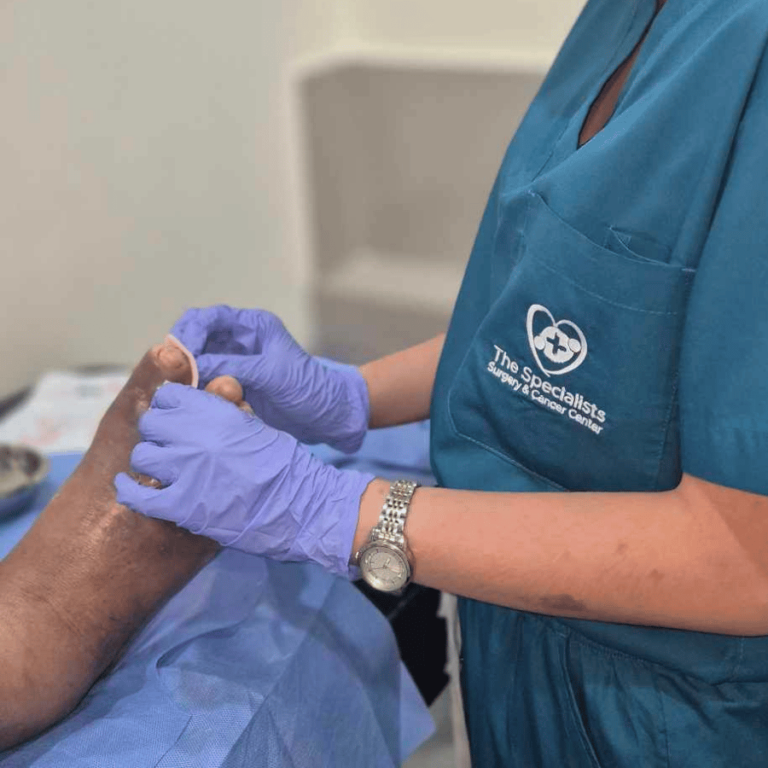Diabetic foot ulcers pose a significant health challenge for many individuals living with diabetes. These wounds, often stubborn and slow to heal, can lead to severe complications if not treated properly. Access to specialized care that focuses on both healing and prevention is essential for improving patient outcomes. Kalingap Wound Care Clinic in Quezon City offers Comprehensive Diabetic Foot Ulcer Management tailored specifically to meet the unique needs of diabetic patients, ensuring effective treatment and long-term foot health.
Understanding Diabetic Foot Ulcer Management
Diabetic foot ulcer management involves a multidisciplinary approach designed to promote wound healing while preventing infections and further complications. Unlike ordinary wound care, this specialized management addresses the complex underlying issues that diabetic patients face, such as poor circulation, nerve damage (neuropathy), and compromised immune response. Through a structured treatment plan, healthcare professionals provide expert wound cleaning, protective dressings, pressure relief strategies, and patient education that together accelerate recovery and reduce risks.
This targeted approach is essential because diabetic foot ulcers often do not heal quickly on their own. Without proper care, ulcers can worsen, leading to infections, gangrene, or even amputation. Therefore, receiving comprehensive treatment from a dedicated wound care center, like Kalingap Wound Care Clinic in Quezon City, is crucial for preventing these outcomes.
Causes and Risks of Diabetic Foot Ulcers
People with diabetes are prone to foot ulcers primarily due to two major complications: neuropathy and peripheral arterial disease. Neuropathy causes nerve damage, leading to a loss of sensation in the feet. As a result, minor injuries or pressure sores often go unnoticed and untreated. Peripheral arterial disease reduces blood flow to the feet, impairing the body’s ability to deliver oxygen and nutrients essential for healing.
Other contributing factors include:
- Poorly controlled blood sugar levels
- Foot deformities or calluses
- Ill-fitting shoes causing friction or pressure
- Previous history of foot ulcers or infections
If diabetic foot ulcers are left unmanaged, the risk of severe infections and limb-threatening complications rises significantly. Early detection and proactive management are the best defense against these risks.
Benefits of Comprehensive Diabetic Foot Ulcer Management
Choosing a thorough and expert-led approach to diabetic foot ulcer care brings numerous benefits:
Accelerated Healing: Professional wound cleaning and debridement remove dead tissue, creating an optimal environment for new tissue growth.
Infection Prevention: Close monitoring and use of targeted antibiotics reduce the risk of infections that can worsen ulcers.
Pressure Relief: Specialized footwear and assistive devices offload pressure from affected areas, allowing wounds to heal without additional trauma.
Improved Circulation: Treatments that enhance blood flow support tissue regeneration and faster recovery.
Education and Prevention: Patients learn vital foot care techniques, proper footwear selection, and blood sugar management strategies to prevent future ulcers.
Kalingap Wound Care Clinic integrates all these elements into a personalized treatment plan, maximizing healing potential and minimizing complications.
Who Needs Diabetic Foot Ulcer Management?
Not every diabetic patient will require intensive wound care, but certain symptoms signal the need for expert intervention, including:
- Presence of a foot ulcer or open sore that does not heal
- Persistent swelling, redness, or pain around foot wounds
- Signs of infection such as drainage or foul odor
- Numbness or tingling due to nerve damage
- Chronic wounds that have failed to improve over time
If any of these symptoms are present, it is vital to seek Comprehensive Diabetic Foot Ulcer Management in Quezon City promptly to avoid escalation.
How Kalingap Wound Care Clinic Approaches Treatment
At Kalingap Wound Care Clinic in Quezon City, every patient receives a carefully planned, step-by-step treatment protocol:
Comprehensive Assessment: An initial evaluation includes thorough examination of the ulcer, assessment of blood circulation, and review of medical history. This helps develop a customized care plan tailored to the patient’s specific condition.
Wound Cleaning and Debridement: Removing dead or infected tissue is crucial to prevent infection and promote healthy tissue growth. This process is done carefully and professionally to minimize discomfort.
Specialized Dressings and Offloading: Protective wound dressings are applied to maintain a moist healing environment and reduce contamination risk. Offloading devices or therapeutic footwear redistribute pressure away from the ulcer site, preventing further injury.
Infection Control: Regular monitoring ensures early detection of infection. When necessary, targeted antibiotic therapy is administered to control bacterial growth and avoid complications.
Patient Education: Empowering patients with knowledge about daily foot care, appropriate footwear, and strict blood sugar management helps reduce the chance of recurrent ulcers.
This comprehensive, patient-centered approach is designed not just for treatment but also for sustainable foot health.
Why Choose Kalingap Wound Care Clinic in Quezon City?
Several factors make Kalingap Wound Care Clinic a preferred destination for diabetic foot ulcer management in Quezon City:
Specialized Expertise: The clinic’s team is trained in the latest medical advancements for diabetic wound care, ensuring patients receive the most effective and modern treatments available.
Affordable Quality Care: Kalingap balances cost and quality, providing accessible services without compromising patient outcomes.
Comfort and Compassion: Treatments prioritize patient comfort and long-term wellness, focusing on building trust and support throughout recovery.
Convenient Location: Situated in Quezon City, the clinic offers easy access for local residents needing specialized diabetic foot care.
Patients consistently report satisfaction with the clinic’s attentive care and successful healing outcomes.
Practical Tips to Prevent Diabetic Foot Ulcers
Preventing foot ulcers is just as important as managing them. Patients with diabetes can reduce their risk by adopting these habits:
Daily Foot Inspections: Check feet daily for cuts, blisters, redness, swelling, or nail problems. Early detection can prevent worsening.
Proper Footwear: Use well-fitting shoes that protect feet from pressure and injury. Avoid walking barefoot.
Maintain Foot Hygiene: Wash and dry feet thoroughly, especially between toes, to avoid infections.
Control Blood Sugar Levels: Effective diabetes management supports overall wound healing and reduces risk factors.
Routine Medical Checkups: Regular visits to healthcare providers ensure ongoing foot health monitoring.
Educating patients on these preventive measures complements clinical treatment and improves long-term outcomes.
Takeaway
Effective diabetic foot ulcer management requires a specialized, comprehensive approach that addresses not only the wound itself but also the underlying causes and risks. With expert care, advanced treatment methods, and patient education, individuals suffering from diabetic foot ulcers can experience faster healing, fewer complications, and improved quality of life.
For residents of Quezon City seeking reliable and compassionate Comprehensive Diabetic Foot Ulcer Management, Kalingap Wound Care Clinic stands out as a trusted choice. Their expertise, affordable care, and patient-focused approach make them the ideal partner in your journey to recovery and sustained foot health.




